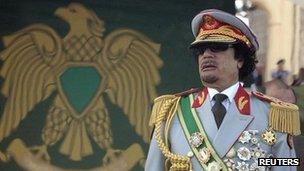Libya reopens its stock exchange
- Published

Gaddafi was overthrown and killed in October 2011
Libya's stock exchange has reopened for the first time since the fall of Colonel Muammar Gaddafi's regime.
The exchange has 10 companies on it and trade on its first day was worth 3.9bn Libyan dinars ($3bn; £2bn), its general manager said.
Almost all of the country's publicly traded firms are banks and insurers, except for al-Ahliya Cement.
Foreign investors will be able to own up to 10% of shares, once the central bank has finalised the law.
A pro-Gaddafi brigade seized the former stock market building in June last year, and so many of the former traders and employees fled with documents and backups in their private cars.
"Before 17 February, there was no rule of law," Ahmed Karoud said, referring to the start of the uprising that overthrew Gaddafi.
There were 13 companies before his removal from power.
"This opening sends a sign to the world that Libya is now a stable country where the economy is kicking off again.
"We still don't have a government but we have the capacity and infrastructure necessary to become the financial hub of North Africa," he added.
The stock market was modelled on Abu Dhabi's, he added. Oil companies, telecoms and property firms are next in line to join.
The exchange also plans to open a second branch in Benghazi.
In December, the UN lifted sanctions on Libya's central bank and foreign investment bank, to help the country deal with a cash crisis, clearing the way for the new government to unlock billions of dollars of assets held abroad.
Col Gaddafi was killed on 20 October after being caught by rebels in his home town of Sirte.
- Published17 February 2012